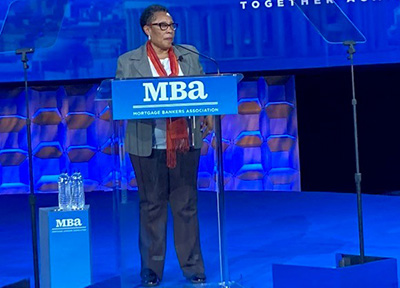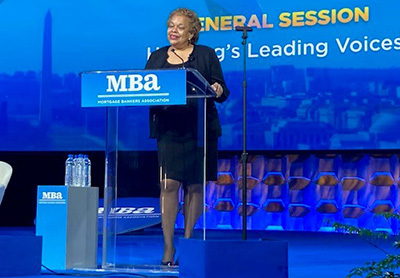
HUD, FHFA Heads Zero in On Housing Affordability, Appraisals

(HUD Secretary Marcia Fudge addresses the MBA Annual Convention & Expo in San Diego Oct. 18.)
SAN DIEGO—Few people have had more impact off the bat than HUD Secretary Marcia Fudge and Federal Housing Finance Agency Acting Director Sandra Thompson.
Both inherited agencies this year that had shifted in mission direction under the Trump Administration. When President Joseph Biden promised to roll back much of the previous administration’s policies, he put Fudge—formerly a member of Congress from Ohio; and Thompson, a career regulator—on the front lines.
“The mortgage banking industry plays a major role in bringing homeownership to Americans, and we at HUD are pleased to be your partners,” Fudge said here at the Mortgage Bankers Association’s Annual Convention & Expo. “We recognize the members of the MBA, and particularly, mortgage servicers, for supporting homeowners during this pandemic. We thank you for what you have done.”
“Our work stands on the twin pillars of good lending: sustainability and affordability,” Thompson said. “Each of these pillars is necessary for safe, sound and effective financing, and each strengthens the other. After all, a loan that a borrower cannot afford is unsustainable: it will stop performing. And loan products, like some of those sold in the first decade of the 2000s that reset from low teaser rates up to unsustainable payment schedules, or contained no income documentation, cannot reasonably be called affordable.”
“Our work is more important than ever,” Fudge said. “The reality is that it is increasingly difficult for people to achieve the dream of homeownership. Unfortunately, it is even more difficult for people of color. It is past time that we address America’s shortage of affordable housing. We are charged to help those who need help. It is time to build up a new America that is better than before.”

And while Fudge and Thompson tapped several familiar touchpoints in their presentations—the coronavirus pandemic and loan forbearance; reducing student loan debt; and confronting racial disparities in housing—they both zeroed in housing affordability and appraisal reform.
Thompson announced two measures to sustainably advance the affordability of homeownership for mortgage borrowers. Over the coming months, Fannie Mae and Freddie Mac will expand certain eligibility requirements for their respective RefiNow and Refi Possible refinance programs aimed at assisting low-income borrowers. Additionally, the Enterprises will be incorporating desktop appraisals into their selling guides for new purchase loans.
Thompson noted when the government-sponsored enterprises established their RefiNow and Refi Possible programs for low-income borrowers, area median income requirements were limited to borrowers with current income at or below 80 percent. The FHFA announcement expands the income threshold to include some moderate-income borrowers, with incomes at or below 100 percent of AMI. In addition, the GSEs are modifying other requirements to address certain operational frictions for lenders.
Second, both Fannie Mae and Freddie Mac will incorporate desktop appraisals into their Selling Guides for many new purchase loans starting in early 2022. The use of desktop appraisals by the Enterprises was one of several temporary flexibilities initiated last year in response to the COVID-19 pandemic. Thompson said this decision is the result of a thorough review of data collected from use of the loan flexibilities, as well as input received from the Request for Input and public listening session on appraisal-related policies, practices, and processes.
“Expanding eligibility for low- and moderate-income families to refinance their mortgage and lower their monthly payments, together with leveraging desktop appraisals to reduce inefficiencies in the mortgage process, are meaningful steps towards overcoming barriers to affordable and sustainable homeownership,” Thompson said.
Donna Corley, Freddie Mac executive vice president and head of Single-Family, said the expanded eligibility will help more low- and moderate-income homeowners refinance affordably.
“Working with our lender clients and the Federal Housing Finance Agency, we are now able to help even more lower-income households reduce their interest rate and their monthly mortgage payment through our Refi Possible,” Corley said. “Our priority is to create more equitable opportunities that responsibly support sustainable homeownership.”
“The enhancements we announced today help expand the reach of RefiNow to additional creditworthy homeowners, further enabling equitable and sustainable access to homeownership,” said Malloy Evans, Executive Vice President and Head of Single-Family, Fannie Mae.
“The rate at which my home appreciates should never be determined by the color of my skin,” Fudge said. “We have assembled a task force to address racism in the appraisal market. It is the first such effort in the history of our country and I am proud to serve as its co-chair.”
“By taking advantage of lower interest rates, borrowers can reduce the share of their income they have to spend on housing costs,” Thompson said. “And given that these are already borrowers with an Enterprise-backed mortgage, they can access these financial benefits with minimal additional risks or costs to the Enterprises or taxpayers.
Thompson said this should be an “urgent priority, as we are seeing significant numbers of lower income and minority Enterprise borrowers stuck in rates 30 to 60 percent higher than the current average. There are even a surprising number of Enterprise borrowers who have been diligently paying the mortgages they received in the 2000s but are still having to pay rates of more than 6 percent.”
To assist these borrowers in lowering their monthly payments, Fannie Mae and Freddie Mac will remove the 10-year seasoning cap from the original program.
“Clearly, we still have work to do to ensure mortgage credit reaches everyone on an equitable basis,” Thompson said. “Our economic recovery has been uneven, and not everyone is necessarily in a place to qualify for a refinance. But that alone doesn’t explain the gaps we are seeing in refinances to creditworthy Enterprise borrowers. And we know from experience with HARP and with programs for lower income and minority borrowers that those with smaller balances tend to get left behind when it comes to refinancing opportunities.”
